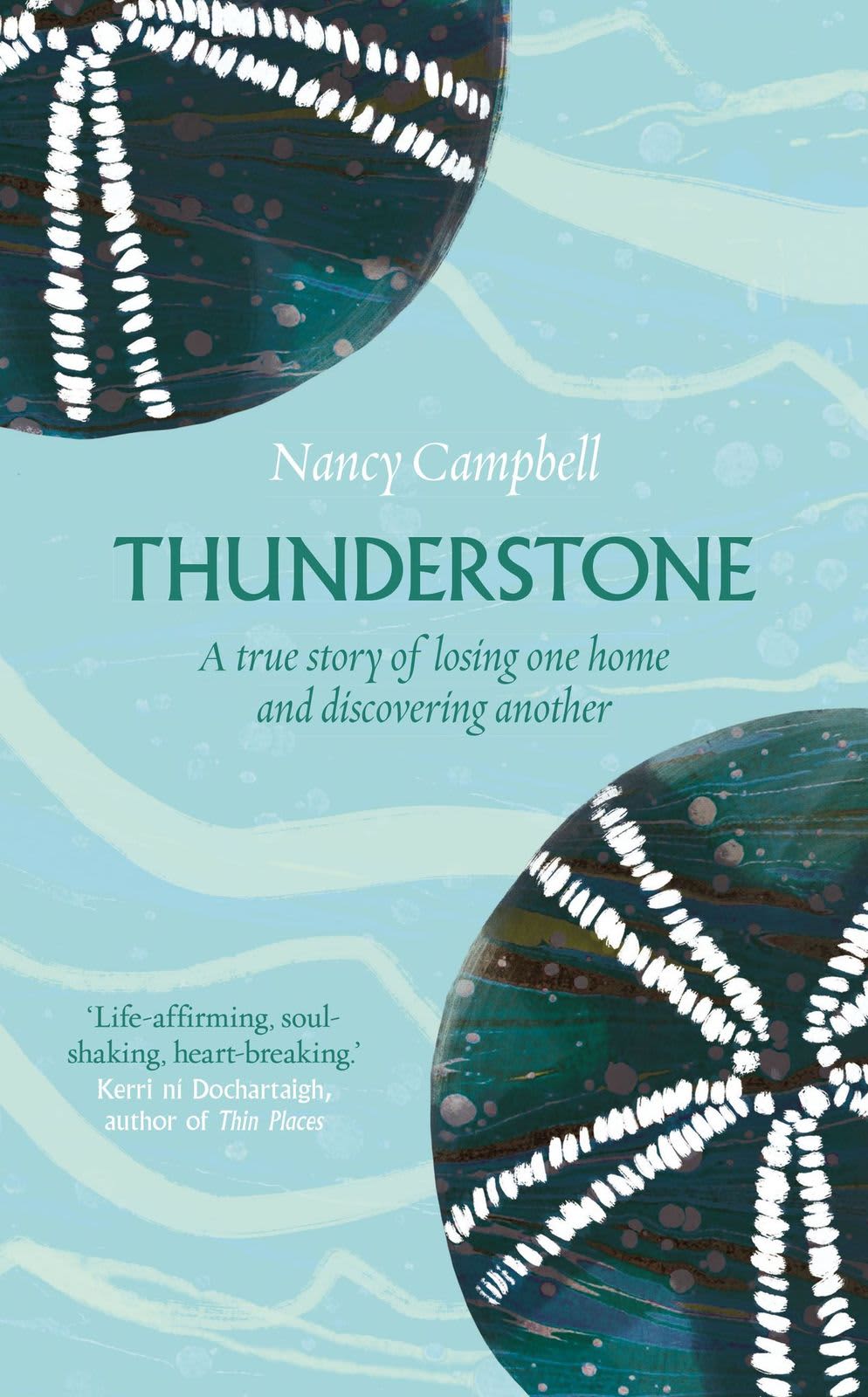Poet and writer Nancy Campbell’s latest work, Thunderstone, describes how she came to live in a converted caravan on a strip of neglected woodland between the canal and the railway north of Wolvercote in Oxford. With a lyrical style familiar to fans of her previous books Disko Bay,The Library of Ice and Fifty Words for Snow, this intimate journal reflects on change, lockdown, loss and self-discovery. We were absolutely thrilled to speak with her to learn more.
How did you come to write Thunderstone?
A ‘thunderstone’ is a small, fossilized sea urchin, found across Scandinavia – and even occasionally in Oxfordshire – once believed to protect homes against storms of life and disaster; you can see one the Pitt Rivers Museum. Thunderstone tells the tale of a time I found myself looking for such protection and questioning notions of home. As rumours of a virus began to emerge from Wuhan, I was in hospital for other reasons: my partner had suffered a major stroke; after several months in rehab Anna was released home on the first day of lockdown. While the world outside our rented basement struggled with the pandemic, Anna and I slowly rebuilt our lives, forging a newly separate but supportive friendship. After lockdown, I needed to move on, but an affordable home is not an easy prospect in Oxfordshire. I bought a 1984 Buccaneer caravan and pitched it in a woodland beside the canal...
Where does it fit in your impressive body of work to date?
My writing has always been about landscape, and how the environments we live in affect us. From 2010, when I left my day job as a bookseller in London to live in the most northern museum in the world, on the island of Upernavik in Arctic Greenland. I witnessed the lives of Inuit hunters on the sea ice and recorded experiences of climate change, in my book Disko Bay. Yet I soon realised climate change is not solely an Arctic story: it's a global phenomenon, influenced by behaviours in the temperate regions, and also evident in changing weather patterns here, as I explore in books like The Library of Ice and Fifty Words for Snow which look at cold cultures more generally. Pre-pandemic, already concerned about my carbon footprint, I had reduced my travel to train journeys across Europe. But during the pandemic every travel writer had to turn their attention closer to home. For me, living in this beautiful and richly historical region, I found no shortage of material on my doorstep.
How did you settle on Oxford?
I came here as a teenager from the Northumberland moors to study at Lady Margaret Hall. After my degree I pursued a nomadic life of work travelling between artists' studios in the Canadian Rockies, east-side Manhattan, the Arctic, and the Alps. Yet Oxford has always drawn me back. It's as if it has a magnetic pull on my heart. I’ve worked all kinds of jobs here to support my writing, from bookbinder to kayak coach. I particularly like the magic places outlying the city such as Boar’s Hill, once a haven for poets like John Masefield and Robert Graves. It's the perfect city for a writer, a crossroads of reality and the imagination. Philip Pullman’s description in The Subtle Knife of a place where rifts in the fabric of this world might lead us into other worlds is not far from my own experience. I’ve found kindred spirits here, real and imaginary. The willow glade where I pitched my caravan - as described in Thunderstone - is one of these enchanted places, and I feel fortunate to have found it.
“I’ve meandered through unfamiliar neighbourhoods, discovering handy treasures: boxes of windfalls at the back gates of a convent, or jars of honey with a hopeful honesty box down a lavender path. Over the low walls of the most unkempt and mysterious front gardens I’ve browsed trestle tables exhibiting (“free to a good home”) cuttings of saxifrage and sempervivums, miniature botanical gardens which hint at an orderly greenhouse hidden somewhere beyond the climbing roses and apple trees hung with Tibetan prayer flags. The main roads of the city branch out like the spokes of a mandala and between them run forgotten alleyways: Cuckoo Lane in the East, Jackdaw Lane in the South. Yet this threshold is the most distinctive one I’ve ever crossed.”
Extract from Thunderstone.
Looking at Oxford through a travel-writer's lens, what is reflected back at you?
One of my favourite travel books on the Arctic is by Tété-Michel Kpomassie, and describes his journey to Greenland from Togo in the 1960s. I learnt from Kpomassie the importance of context, and so I try to give a broad view in my books: not only the horizon, but my background too. As an example, in The Library of Ice I was fascinated on my return from the Arctic to find reflections of my icy obsession in the city, such as Robert Boyle’s 17th century “experiments touching cold” in his rooms off Oxford’s High Street. And while writing Thunderstone, I found the Mediterranean manifest by the railway tracks: in the form of ‘Oxford ragwort’, a species brought here from the volcanic soils of Sicily in the late 17th century, the seeds of which escaped the enclosed plots of the Botanical Gardens by the river Cherwell and took root in the clinker ash of the railway (having a predilection for soils that had been subjected to heat). The plant soon spread to other parts of England along the rails.
What did you learn about yourself during the writing process?
During lockdown, like many people, I gained a deeper appreciation of community. Then, away from the bonds and fears and responsibilities of a carer's role I learnt how to care for myself again and channel my grief into creativity. This was brought into focus by the need to keep a tiny home (which sometimes seemed small as a Kinder Egg) in order: ensuring the workings of temperamental gas and electricity and fetching water, and also nurturing the wider ecology by turning a bit of waste-ground into a wild garden. While the caravan was my opportunity to go solo, I soon got to know my immediate neighbours: the wren that nests in the willow and the foxes that play in the woods at dawn – and forging friendships among the community of boaters living on the canal.
How does having to adapt your language adapt your thoughts?
Living with (and being a carer for) someone with aphasia and a brain injury brings many insights into the wonder and complexity of human language. At the same time, for a while I found myself unable to write anything for publication - I was too full of grief. I kept a private journal of my days in the van. Then, slowly as the weeks passed, I realised these very private words, and the notes-to-self, new experiences and life lessons that were unfurling in them, were my next book.
What are your plans for the future?
It seems impossible to make future plans in these still uncertain times, but I'm grateful for every day in this beautiful place. I hope to continue to explore the community along the Oxford Canal and further afield too: this autumn I will be walking the Thames Path, from source to sea. Oh, and I also need to fix the caravan's water heater, ready for winter.
Nancy Campbell is the author of Thunderstone: A true story of losing one home and discovering another, published by Elliott & Thompson on 11 August 2022. Available at all good book shops.









